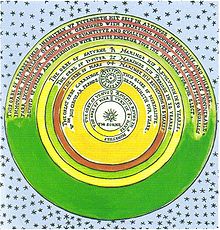Thomas Digges
Thomas Digges (1546 – August 24 1595) was an English astronomer, son of Leonard Digges, inventor of the theodolite, and great populariser of science. After the death of his father, Thomas grew up under the guardianship of John Dee, a typical Renaissance natural philosopher.
He attempted to determine the parallax of the 1572 supernova observed by Tycho Brahe, and concluded it had to be beyond the orbit of the Moon. This contradicted the accepted view of the universe, according to which no change could take place among the fixed stars.
In 1576 he published a new edition of his father's perpetual almanac, A Prognostication everlasting. The text written by Leonard Digges for the third edition of 1556 was left unchanged, but Thomas added new material in several appendices. The most important of these was A Perfit Description of the Caelestiall Orbes according to the most aunciente doctrine of the Pythagoreans, latelye revived by Copernicus and by Geometricall Demonstrations approved. Contrary to the Ptolemaic cosmology of the original book by his father, the appendix featured a detailed discussion of the controversial and still poorly known Copernican heliocentric model of the Universe. This was the first publication of that model in English, and a milestone in the popularisation of science. For the most part, the appendix was a loose translation into English of chapters from Copernicus' book De revolutionibus orbium coelestium. However, Thomas Digges actually went further by indicating a multitude of stars extending to infinity.
An illustration of the Copernican universe can be seen here.

The outer inscription on the map reads:
"This orb of stars fixed infinitely up extends itself in altitude spherically, and therefore immovable the palace of felicity garnished with perpetual shining glorious lights innumerable, far excelling over [the] sun both in quantity and quality the very court of celestial angels, devoid of grief and replenished with perfect endless joy, the habitacle for the elect."
Digges served as a Member of Parliament for Wallingford and also had a military career as a Muster-Master General to the English forces from 1586 to 1594 during the war with the Spanish Netherlands.
Thomas Digges was the father of Sir Dudley Digges (1583-1639), politician and stateman, and Leonard Digges (1588-1635), poet.
References
- Gribbin, John 2002. Science : A History. Penguin.
- Francis R. Johnson, Astronomical Thought in Renaissance England: A Study of the English Scientific Writings from 1500 to 1645, Johns Hopkins Press, 1937.
- Francis R. Johnson and Sanford V. Larkey, "Thomas Digges, the Copernican System and the idea of the Infinity of the Universe in 1576," Huntington Library Bulletin 4 (1934): 29-117.
- Includes the text of the Perfit Daescription
